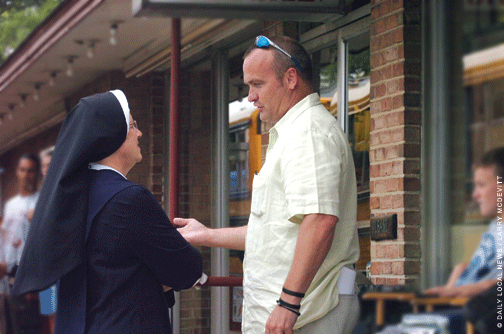
Class of ’85 | Standing in the middle of his living room, his arms crossed over a black North Face fleece, Tim Chambers C’85 watches the opening credits scroll on the latest underdog sports film. Resting on the bookshelf beside his flat-screen are a few classics of that genre, such as Rudy, Cinderella Man, and A League of Their Own.
But the film Chambers just popped into his DVD player—the one he’s already seen, by his own estimation, several hundred times—is different.
That’s because he wrote, produced, and directed Our Lady of Victory, a film scheduled for release this fall.
Crafted in the mold of Hoosiers, with a splash of Sister Act thrown in, Chambers’ production is based on the 1971-72 women’s basketball team at Immaculata College (now University), a tiny, Catholic institution in Chester County, Pennsylvania. Led by a sassy young coach named Cathy Rush (played by Carla Gugino), the team captured the first-ever women’s basketball national championship. That most unlikely of sports dynasties—a group of girls in tunic uniforms and pigtails, cheered on by nuns banging pots—went on to win two more national championships.
“You couldn’t write it and have people believe this actually happened—except it did happen,” says Rush, a recent inductee into the Basketball Hall of Fame. The former coach always believed her story was right for the big screen, a notion fueled by the many scripts she received over the past three decades. But the Immaculata story typically fizzled in the developmental stage as Hollywood executives sought a breezy “chick flick” rather than an inspiring sports film for women.
Enter Chambers, who knows something about being an underdog himself.
Growing up with 11 siblings—one of whom, Paul Chambers C’92, was a star basketball player at Penn—Tim Chambers had a unique childhood in which he could walk out of his Newtown Square home and play a spirited game of 4-on-4 driveway hoops with his brothers.
At Penn, under coach Jerry Berndt, Chambers helped propel a once-dismal football program to the top of the Ivy League. The Quakers won three straight conference championships, sharing the first two before sweeping through the Ivies in 1984. Chambers was named the 1984 Ivy League Player of the Year—an impressive accomplishment for a defensive back who weighed 175 pounds soaking wet.
Chambers’ Rudy story continued after college when he signed a free-agent contract with the Philadelphia Eagles. Living across the hall from another rookie named Randall Cunningham and singing the Penn fight song in front of the likes of Ron Jaworski, Mike Quick, and Herm Edwards were memorable experiences. Pulling his hamstring was memorable in a very different way.
“The difference is maybe two-tenths of a second,” says Chambers. “But,” he adds, pointing to his TV, “that’s the difference from being on there and watching it.”
Let go by the Eagles, he was cut in training camp a year later by the Indianapolis Colts. Reluctantly, he started life in the real world, as a well-paid stockbroker. But the suit just didn’t fit him.
“I have to be really passionate about something when I wake up,” he says. “And I knew even then, especially after coming out of football where you need to be completely committed to something, that I didn’t have that.”
Three years after graduating from Penn, Chambers jammed his Ford Taurus with as many suitcases as he could fit and set off for Hollywood, his wife Kathleen riding shotgun. Upon his arrival, Chambers set out to find work, any work, in the movie industry. He dug through his Penn contacts, landing an unpaid internship with a production company, where his primary role was reading scripts.
His passion rejuvenated, Chambers worked his way up through the movie business, eventually landing a job as director of the Pennsylvania Film Office. Later, he partnered with another Penn football player, Gavin O’Connor C’86, to create a television pilot based on his own childhood called Murphy’s Dozen, which was not picked up.
After O’Connor went on to direct the hit sports flick Miracle in 2004 [“All Things Ornamental,” May|June 2004], Chambers caught the directing bug himself. Around that time Marie Moughan, Immaculata’s public-relations director, saw his picture in the newspaper and placed a phone call to his brother, her old friend Pat Chambers, now associate head coach of men’s basketball at Villanova.
“We also have a story to be told,” Moughan told Pat. “It’s similar to Miracle. I wonder if your brother would be interested.”
Tim, who remembered the great Immaculata teams that once practiced inside his own elementary-school gym, was indeed interested. He met with Cathy Rush in May of 2004, expressing his desire to make the film while easing some of the coach’s initial cynicism.
“I had a great feeling,” says Rush. “I knew he was going to do it the way Immaculata would be proud of having it done.”
It took nearly 18 months for Chambers and freelance journalist (and WIP radio host) Anthony Gargano to write the screenplay, but the finished product was good enough to earn the previously elusive sign-off from Rush, the former players, the religious order, and other members of the university.
Chambers had then a tricky choice: whether or not to sell the screenplay to a studio.
“Nobody really in his right mind would turn away a big paycheck, especially to take all that risk—because there’s nothing but risk in an independent feature film,” says Whitney Springer, a producer on Victory. “But it was very important to him. He felt particularly obligated to make sure that he had control of the story.”
So in the summer of 2007, in the shadow of his West Chester home, with friends and family roaming around his open set, Chambers directed his first feature film. The budget was a modest $6.5 million—most of it funded by former 76ers owner Pat Croce, Chambers’ business partner in the Quaker Media production company they co-founded—but the cast, headlined by Gugino and Academy Award winner Ellen Burstyn, is an impressive one. The film was also given a sparkling touch by veteran editor Bud Smith and composer William Ross of Harry Potter fame. It’s the ultimate underdog story.
“You’re seeing his dream come true right in front of you, just like Cathy Rush’s dream once came true,” said Croce one day on the set. “She ended up with a championship trophy. I’m hoping he ends up with an Oscar.”
—Dave Zeitlin C’03




